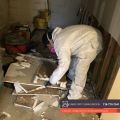Understanding the Effects of Mold on Human Health

Mold is more than just an unsightly nuisance; it can have serious implications for human health. From mild allergic reactions to severe respiratory issues, exposure to mold can impact individuals differently depending on factors such as sensitivity, duration of exposure, and the type of mold present. Recognizing the symptoms of mold exposure, the advantages of frequent mold inspections, and how to stay safe are crucial for maintaining a healthy indoor environment. Bay Area Mold Pros, with their professional mold inspection and testing services, offers valuable insights and solutions to mitigate the health risks associated with mold exposure.
Exposure to mold can trigger a variety of symptoms, ranging from mild irritation to severe health issues. Common symptoms of mold exposure include:
- Allergic Reactions: Sneezing, runny or stuffy nose, itchy eyes, throat irritation, and skin rash.
- Respiratory Issues: Wheezing, coughing, shortness of breath, chest tightness, and exacerbation of asthma symptoms.
- Headaches: Persistent headaches, migraines, and fatigue.
- Sinus Infections: Sinus congestion, sinusitis, and sinus headaches.
- Neurological Symptoms: Memory loss, difficulty concentrating, and confusion (in cases of prolonged exposure to toxic molds).
Advantages of Frequent Home & Commercial Mold Inspections
- Early Detection: Regular mold inspections can help identify mold growth early on, allowing for prompt remediation to prevent further spread and potential health issues.
- Preventive Measures: By addressing underlying moisture issues and potential mold hotspots, frequent inspections can help prevent mold growth before it becomes a serious problem.
- Health Protection: Regular mold inspections help protect the health and well-being of occupants by reducing exposure to mold spores and mitigating health risks associated with mold exposure.
- Property Preservation: Timely identification and remediation of mold issues can prevent structural damage to buildings and minimize the need for costly repairs.
How Mold Makes People Sick and How to Stay Safe
Mold can make people sick through various mechanisms, including:
- Allergenic Response: Mold spores can trigger allergic reactions in sensitive individuals, leading to symptoms such as sneezing, coughing, and skin irritation.
- Toxic Effects: Certain molds, such as Stachybotrys (black mold), produce mycotoxins that can cause severe health issues, including respiratory problems, neurological symptoms, and immune suppression.
To stay safe from mold-related health risks:
- Keep Indoor Spaces Clean and Dry: Regularly clean and dry indoor areas prone to moisture buildup, such as bathrooms, kitchens, and basements.
- Maintain Proper Ventilation: Ensure adequate ventilation in all areas of the home or workplace to reduce humidity levels and prevent mold growth.
- Address Water Damage Promptly: Address water leaks, floods, and plumbing issues promptly to prevent moisture buildup and mold growth.
- Schedule Regular Mold Inspections: Schedule regular mold inspections with certified professionals like Bay Area Mold Pros to identify and address mold issues before they become a health hazard.
Request an Inspection Today
To schedule a mold inspection with Bay Area Mold Pros, call (650) 762-6228 or visit their website to request an appointment. Their certified mold inspectors will conduct a thorough assessment of your home or commercial property, providing accurate analysis and actionable recommendations to ensure a safe and healthy indoor environment for you and your occupants.
Conclusion
Understanding the effects of mold on human health, recognizing the symptoms of mold exposure, and taking proactive steps to mitigate health risks are essential for maintaining a healthy indoor environment. With professional mold inspection and testing services from Bay Area Mold Pros, homeowners and business owners can protect themselves and their occupants from the adverse effects of mold exposure. Request an inspection today and take the first step towards a healthier living and working environment.





